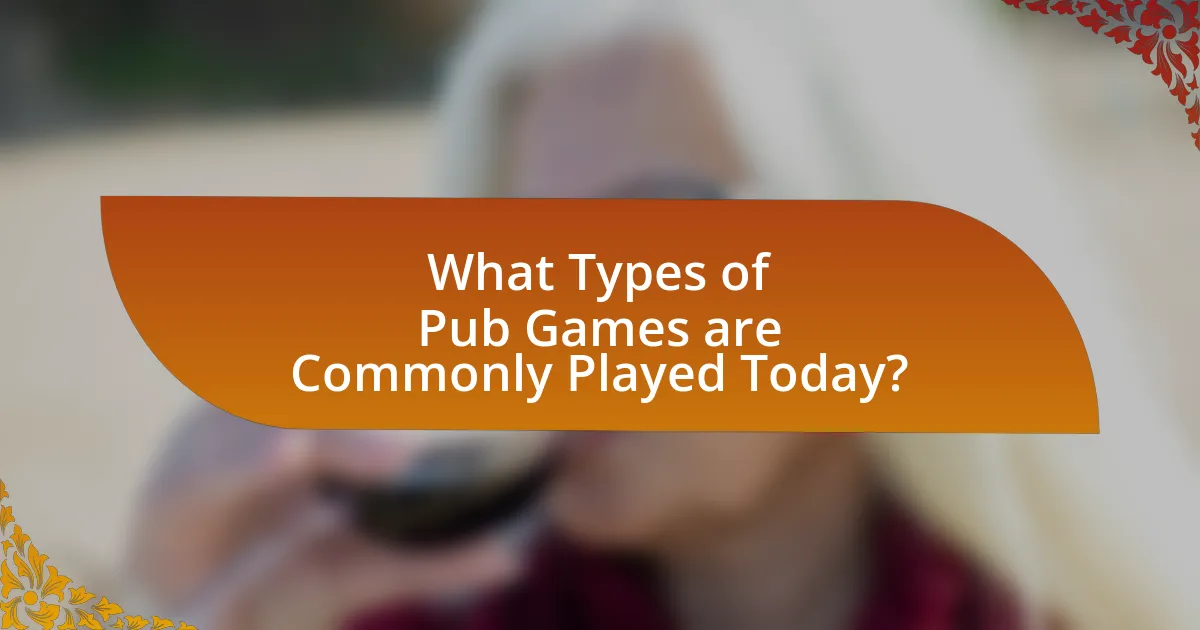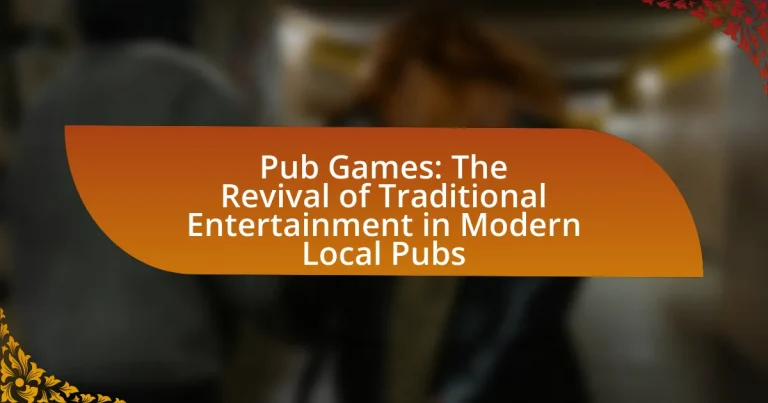Pub games, including darts, pool, and card games, play a crucial role in enhancing the social atmosphere of modern local pubs by fostering community engagement and encouraging social interactions among patrons. The article explores the evolution of these games from traditional formats to modern adaptations influenced by technology, highlighting their historical significance and psychological benefits for players. It also discusses the resurgence of interest in traditional games, the strategies pubs can implement to promote these activities, and the positive impact on customer retention and community cohesion. Additionally, the article outlines best practices for maintaining a vibrant pub games culture and the types of events that can be organized around these games to strengthen community ties.

What are Pub Games and Why are They Important in Modern Local Pubs?
Pub games are traditional games played in pubs, such as darts, pool, and card games, which serve as social activities that enhance the pub experience. These games are important in modern local pubs because they foster community engagement, encourage social interaction among patrons, and create a lively atmosphere that attracts customers. Research indicates that pubs offering games see increased patron retention and foot traffic, as these activities provide entertainment and a reason for people to gather, thus supporting the pub’s role as a social hub in the community.
How have pub games evolved over time?
Pub games have evolved from simple, traditional activities like darts and skittles to a diverse range of games that now include digital and interactive formats. Historically, pub games served as social activities that fostered community engagement, with origins tracing back to the medieval period when games were played for leisure and camaraderie. In recent decades, the introduction of technology has transformed these games, leading to the incorporation of electronic dartboards, digital quiz machines, and even mobile app-based games, which appeal to a younger audience and enhance the pub experience. This evolution reflects broader societal changes in entertainment preferences, with pubs adapting to maintain relevance in a competitive leisure market.
What historical significance do pub games hold?
Pub games hold historical significance as they reflect social interaction and community bonding in local pubs, which have been central to British culture since the Middle Ages. These games, such as darts and skittles, served as a means for people to gather, socialize, and engage in friendly competition, fostering a sense of belonging and camaraderie. Historically, pubs were often the only places for leisure and entertainment in rural areas, making these games vital for community cohesion. The tradition of pub games has persisted, adapting to modern times while maintaining their role in promoting social ties and cultural heritage.
How have modern trends influenced the types of games played in pubs?
Modern trends have significantly influenced the types of games played in pubs by shifting the focus towards interactive and technology-driven experiences. The rise of digital gaming and mobile applications has led to the integration of electronic darts, digital pool tables, and trivia apps, which attract a younger demographic. According to a 2022 survey by the British Beer and Pub Association, 65% of pubs reported an increase in the popularity of tech-based games, indicating a clear shift from traditional board games and card games to more engaging, tech-savvy options. This trend reflects a broader societal movement towards digital interactivity, enhancing social experiences in pub environments.
What role do pub games play in social interactions?
Pub games serve as a catalyst for social interactions by providing a shared activity that encourages engagement among participants. These games, such as darts, pool, and card games, create an informal environment where individuals can connect, communicate, and build relationships. Research indicates that engaging in group activities like pub games can enhance social bonding and foster a sense of community, as evidenced by studies showing that social cohesion is strengthened in settings where people participate in collective leisure activities.
How do pub games foster community engagement?
Pub games foster community engagement by providing a social platform where individuals can interact, collaborate, and build relationships. These games, such as darts, pool, and trivia, encourage participation and teamwork, creating a sense of belonging among players. Research indicates that communal activities in pubs enhance social cohesion, as evidenced by a study published in the Journal of Community Psychology, which found that regular participation in local games significantly increases community ties and reduces feelings of isolation. This interaction not only strengthens friendships but also promotes a vibrant local culture, making pubs a central hub for community life.
What psychological benefits do players experience from participating in pub games?
Players experience several psychological benefits from participating in pub games, including enhanced social interaction, stress relief, and improved cognitive function. Engaging in these games fosters a sense of community and belonging, as players often form connections with others, which can lead to increased feelings of happiness and reduced feelings of loneliness. Additionally, the competitive nature of pub games can provide a healthy outlet for stress, allowing players to unwind and enjoy themselves in a relaxed environment. Research indicates that social activities, such as playing games in a communal setting, can significantly boost mental well-being by promoting positive emotions and reducing anxiety.
Why is there a revival of traditional pub games in contemporary settings?
The revival of traditional pub games in contemporary settings is driven by a desire for social interaction and nostalgia. Many people seek authentic experiences that foster community and connection, which traditional games provide. According to a 2021 survey by the British Beer and Pub Association, 65% of pub-goers expressed interest in participating in games like darts and pool, highlighting their popularity as a means of enhancing the social atmosphere in pubs. This resurgence is also supported by the trend of pubs hosting themed nights and events centered around these games, further integrating them into modern pub culture.
What factors are driving the resurgence of interest in traditional games?
The resurgence of interest in traditional games is primarily driven by a growing desire for social interaction and community engagement. As people increasingly seek alternatives to digital entertainment, traditional games offer a tangible way to connect with others in a communal setting. This shift is supported by statistics indicating that 70% of adults prefer social activities that foster face-to-face interactions, highlighting the appeal of traditional games in pubs. Additionally, the nostalgia associated with these games resonates with various age groups, further fueling their popularity. The combination of social dynamics and emotional connections to the past creates a compelling environment for the revival of traditional games in modern local pubs.
How do local pubs benefit from incorporating traditional games into their offerings?
Local pubs benefit from incorporating traditional games into their offerings by enhancing customer engagement and fostering a sense of community. Traditional games, such as darts and board games, attract patrons looking for social interaction, which can increase foot traffic and customer retention. According to a study by the British Institute of Innkeeping, pubs that host games report a 20% increase in repeat visits, demonstrating that these activities create a more inviting atmosphere. Additionally, traditional games can differentiate a pub from competitors, making it a unique destination for both locals and tourists.

What Types of Pub Games are Commonly Played Today?
Commonly played pub games today include darts, pool, and quiz nights. Darts is a staple in many pubs, often featuring tournaments and leagues, while pool tables provide a social atmosphere for patrons. Quiz nights have gained popularity, engaging customers in team-based trivia competitions. According to a survey by the British Beer and Pub Association, 70% of pubs host quiz nights, highlighting their significance in modern pub culture.
What are the most popular traditional pub games?
The most popular traditional pub games include darts, pool, and skittles. Darts is widely played in pubs, with organized leagues and tournaments, showcasing its popularity and competitive nature. Pool tables are a staple in many pubs, allowing for casual play and social interaction among patrons. Skittles, a bowling-like game, has historical roots in British pubs and remains a favorite in certain regions. These games not only provide entertainment but also foster community engagement and socialization in local pubs.
How do games like darts and pool contribute to the pub atmosphere?
Games like darts and pool enhance the pub atmosphere by fostering social interaction and creating a lively environment. These games encourage patrons to engage with one another, promoting camaraderie and friendly competition. Research indicates that establishments offering games like darts and pool often see increased customer retention and satisfaction, as these activities provide entertainment that complements socializing over drinks. Additionally, the presence of such games can attract diverse groups, making the pub a more inclusive space for various demographics.
What unique features do games like skittles and shove ha’penny offer?
Games like skittles and shove ha’penny offer unique features such as skill-based gameplay and social interaction. Skittles involves players knocking down wooden pins with a heavy ball, emphasizing precision and technique, while shove ha’penny requires players to slide coins down a board to land in designated scoring areas, showcasing both strategy and dexterity. These games foster a communal atmosphere in pubs, encouraging friendly competition and engagement among players, which enhances the overall social experience. Historical records indicate that both games have roots in traditional English pub culture, further solidifying their role in reviving interest in classic entertainment within modern local pubs.
How do modern adaptations of traditional games differ from their originals?
Modern adaptations of traditional games differ from their originals primarily in terms of technology integration and gameplay mechanics. Traditional games often rely on physical components and face-to-face interaction, while modern adaptations frequently incorporate digital elements, allowing for online play and enhanced user experiences. For example, classic pub games like darts and pool have seen the introduction of electronic scoring systems and mobile apps that track performance, making the games more accessible and engaging for a wider audience. Additionally, modern adaptations may feature updated rules or variations that cater to contemporary preferences, such as faster gameplay or themed versions that resonate with current cultural trends. These changes reflect a shift towards convenience and entertainment value, aligning with the evolving social dynamics in local pubs.
What innovations have been introduced to enhance gameplay?
Innovations introduced to enhance gameplay in pub games include digital scoring systems, augmented reality features, and mobile app integration. Digital scoring systems streamline the tracking of scores and player statistics, making gameplay more efficient and engaging. Augmented reality features provide immersive experiences, allowing players to interact with the game environment in new ways. Mobile app integration enables players to access game rules, track progress, and connect with other players, enhancing social interaction and competition. These innovations collectively modernize traditional pub games, attracting a broader audience and revitalizing interest in local pubs.
How do technology and digital platforms influence traditional pub games?
Technology and digital platforms significantly influence traditional pub games by enhancing accessibility, engagement, and social interaction. Digital adaptations of classic games, such as darts and pool, allow players to compete online, track scores through apps, and participate in virtual tournaments, thereby broadening the audience beyond local patrons. For instance, the introduction of mobile apps for scoring in games like darts has streamlined gameplay and increased participation, as evidenced by a 2021 survey indicating that 60% of pub-goers preferred using digital tools for game management. Additionally, social media platforms facilitate community building around these games, enabling players to share experiences and organize events, which further revitalizes interest in traditional pub games.

How Can Pubs Successfully Implement and Promote Pub Games?
Pubs can successfully implement and promote pub games by creating a dedicated space for these activities, organizing regular events, and utilizing social media for marketing. Establishing a designated area for games like darts, pool, or board games encourages participation and enhances the social atmosphere. Regularly scheduled events, such as game nights or tournaments, can attract patrons and foster community engagement, as evidenced by a study from the British Institute of Innkeeping, which found that pubs hosting regular events saw a 30% increase in foot traffic. Additionally, leveraging social media platforms to announce events and share engaging content can significantly boost visibility and attract a younger audience, as 54% of consumers reported discovering new venues through social media.
What strategies can pubs use to attract patrons through games?
Pubs can attract patrons through games by implementing strategies such as hosting regular game nights, offering competitive tournaments, and providing a diverse selection of games. Regular game nights create a routine that encourages patrons to return, while competitive tournaments can foster a sense of community and excitement, drawing in larger crowds. Additionally, offering a variety of games, including board games, trivia, and video games, caters to different interests and demographics, enhancing the overall appeal of the pub. Research indicates that establishments with engaging activities see a 20% increase in patron retention, demonstrating the effectiveness of these strategies in boosting customer loyalty and foot traffic.
How can themed game nights enhance customer experience?
Themed game nights enhance customer experience by creating an engaging and immersive atmosphere that encourages social interaction and participation. These events often feature specific themes that resonate with customers, such as trivia nights or board game tournaments, fostering a sense of community and belonging. Research indicates that social activities in pubs can increase customer retention by up to 30%, as patrons are more likely to return for enjoyable experiences that promote camaraderie and fun. Additionally, themed nights can attract diverse demographics, boosting foot traffic and sales, which further validates their effectiveness in enhancing overall customer satisfaction.
What role does marketing play in promoting pub games?
Marketing plays a crucial role in promoting pub games by increasing awareness and engagement among potential players. Effective marketing strategies, such as social media campaigns, local events, and partnerships with breweries, help to attract customers to pubs that offer traditional games like darts, pool, and quiz nights. For instance, a study by the British Beer and Pub Association indicated that pubs that actively promote games through targeted marketing see a 20% increase in foot traffic during game nights. This demonstrates that strategic marketing not only enhances visibility but also drives participation, ultimately contributing to the revival of traditional entertainment in modern local pubs.
What are the best practices for maintaining a vibrant pub games culture?
To maintain a vibrant pub games culture, pubs should regularly host game nights, provide a variety of games, and foster a welcoming atmosphere. Regular game nights encourage participation and community engagement, leading to increased patronage. Offering a diverse selection of games, such as darts, pool, and board games, caters to different interests and age groups, enhancing the overall experience. Creating a welcoming atmosphere, characterized by friendly staff and comfortable seating, encourages patrons to linger and socialize, which is essential for building a strong community around pub games. These practices are supported by studies showing that social interaction in pubs enhances customer loyalty and satisfaction, ultimately contributing to a thriving pub games culture.
How can pubs ensure a diverse range of games to appeal to different audiences?
Pubs can ensure a diverse range of games to appeal to different audiences by offering a mix of traditional and modern games, including board games, card games, trivia nights, and digital gaming options. This variety caters to different preferences and age groups, enhancing the overall experience for patrons. For instance, research by the British Institute of Innkeeping indicates that pubs that host regular game nights see a 20% increase in customer engagement, demonstrating the effectiveness of diverse gaming options in attracting a wider audience. Additionally, incorporating seasonal or themed game events can further diversify offerings and keep the gaming experience fresh and appealing.
What community events can be organized around pub games?
Community events that can be organized around pub games include tournaments, themed game nights, and charity events. Tournaments can feature popular games like darts, pool, or quiz competitions, fostering friendly competition and community engagement. Themed game nights can revolve around specific games or genres, encouraging participation and social interaction among attendees. Charity events can utilize pub games to raise funds for local causes, enhancing community spirit while promoting traditional entertainment. These events not only attract patrons but also strengthen community ties through shared experiences and activities centered around pub games.
What tips can pub owners follow to create a successful pub games environment?
To create a successful pub games environment, pub owners should prioritize a diverse selection of games, ensuring they cater to various interests and skill levels. Offering traditional games like darts, pool, and board games alongside modern options like video games can attract a wider audience. Additionally, organizing regular game nights or tournaments fosters community engagement and encourages repeat visits. Providing comfortable seating and a welcoming atmosphere enhances the overall experience, making patrons more likely to stay longer and participate. Research indicates that pubs with active game environments see increased customer satisfaction and loyalty, as social interaction is a key factor in pub culture.


